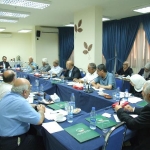Al-Zaytouna Centre for Studies and Consultations held on 14/8/2014 a panel discussion entitled “The Israeli Offensive on Gaza Strip and its Impact.” The panel, held in Al-Zaytouna headquarters in Beirut, tackled the offensive on the Gaza Strip (GS) and its impact and repercussions on the Palestinian issue. A select of researchers, academics, and specialists participated in the panel discussion which was divided into two sessions.
In his opening remarks, al-Zaytouna General Manager Prof. Dr. Mohsen Mohammad Saleh welcomed the participants and highlighted the main points to be addressed in the discussion. He presented a summary of recent developments of the offensive on GS including important figures regarding the major losses caused by the Israeli assault. He also pointed out to the fact that the June 2014 offensive on GS was different from former assaults, especially as the Resistance showed unequalled performance demonstrated in land, air and sea operations, which caused Israel severe economic and military losses. The Resistance was able to target the security and economic system in Israel causing the Netanyahu government to face a political impasse after the failure of the Israeli army in GS, Saleh added.
The participants praised the ability of the Resistance to seclude itself from regional conflicts, which were part of Israel’s calculations when it decided to attack GS. They pointed out that such conflicts were part of a comprehensive strategy to rearrange the region, including doing away with political Islam. However, the Resistance tipped the balance and defeated the occupation forces, while boosting national action and the Islamic project. The participants noticed that the offensive, together with the steadfastness of the Resistance, has led to wide worldwide solidarity, both at official and popular levels, in support of the Palestinian issue. In addition, the war foiled the Israeli military strategy and established for new fighting theories such as “Hold on and Engage” instead of “Hit and Run.”
As for possible scenarios and solutions, the participants reiterated the importance of achieving a political victory at the level of Cairo negotiations aimed to reach ceasefire agreement similar to the victory achieved in the field. In addition, they stressed the need to unify efforts to complete Palestinian national reconciliation, put the Palestinian political house in order, and establish common Palestinian vision, which adopts the resistance option and reshuffles the priorities of the Palestinian negotiator.
They agreed that the current stage in the history of the Palestinian issue is witnessing major success interpreted in the consistence between the military and political levels, where the Palestinian delegation to Cairo has expressed consensual refusal of disarming the Palestinian Resistance. Participants warned against procrastination and maneuvers which aim at dropping down the demands of the Resistance. They called for embracing the demands of the Palestinian people without any concessions. They also called for achieving more field victories, consecrating national unity, and activating national action in the West Bank (WB) and Jerusalem.
In addition, the discussants emphasized the need to earn international public opinion, provoke Muslim and Arab public opinion and make the Palestinian issue a focal point without being part of any camp or axis. To these they added the need to accomplish quick achievements in order to secure the steadfastness of the people and consolidate the belief that resistance is a legitimate right.
They also recommended the restructuring of the Palestinian leadership and rearranging the situation in GS in a way that protects the Resistance weapons. Other recommendations suggested that the PA reconsiders security coordination with Israel in the WB, head without hesitation to international bodies and institutions including the International Criminal Court to sue Israel over its crimes, in addition to monitoring regional and international developments to benefit from them.
The participants agreed that the Israeli onslaught on GS was only a round, which will be followed by other rounds, and the question is “How to prepare for the next round?”
At the end, Saleh thanked the participants and commended the discussion. He reiterated that the outstanding performance of the Resistance has imposed a new reality, which should be invested towards lifting the siege and enhancing Palestinian national action, while enhancing regional environment to better serve the Palestinian issue.
To read minutes of this panel discussion in Arabic, click here.





Leave A Comment